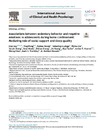| dc.contributor.author | Zou, Liye | |
| dc.contributor.author | Wang, Ting | |
| dc.contributor.author | Herold, Fabian | |
| dc.contributor.author | Ludyga, Sebastian | |
| dc.contributor.author | Liu, Weina | |
| dc.contributor.author | Zhang, Yanjie | |
| dc.contributor.author | Healy, Sean | |
| dc.contributor.author | Zhang, Zhihao | |
| dc.contributor.author | Kuang, Jin | |
| dc.contributor.author | Taylor, Alyx | |
| dc.contributor.author | Kramer, Arthur F. | |
| dc.contributor.author | Chen, Sitong | |
| dc.contributor.author | Tremblay, Mark S. | |
| dc.contributor.author | Hossain, M. Mahbub | |
| dc.date.accessioned | 2023-03-08T15:05:20Z | |
| dc.date.available | 2023-03-08T15:05:20Z | |
| dc.date.issued | 2023-01 | |
| dc.identifier.citation | Zou, L., Wang, T., Herold, F., Ludyga, S., Liu, W., Zhang, Y., Healy, S., Zhang, Z., Kuang, J., Taylor, A. F., Kramer, A., Chen, S., Tremblay, M., & Hossain, M. M. (2023). Associations between sedentary behavior and negative emotions in adolescents during home confinement: Mediating role of social support and sleep quality. International Journal of Clinical and Health Psychology, 23(1). https://doi.org/10.1016/j.ijchp.2022.100337 | en |
| dc.identifier.issn | 1697-2600 | |
| dc.identifier.uri | https://aecc.archive.knowledgearc.net/handle/123456789/174 | |
| dc.description | Available under License - Creative Commons Attribution: https://creativecommons.org/licenses/by-nc-nd/2.0/ | en |
| dc.description.abstract | Background:
Prolonged periods of sedentary behaviour, for instance, engendered by home confinement in Shenzhen city, has led to negative mental health consequences, especially in adolescents. Previous research suggests, in general, that sedentary behavior can increase negative emotions. However, the specific mechanism driving the relationship between sedentary behavior and negative emotions is still relatively unclear. Social support and sleep quality might partly explain the effect of sedentary behavior on negative emotions. Thus, the current study aimed to examine the associations between sedentary behavior and negative emotions, and to investigate if social support and sleep quality mediate such a relationship.
Method:
During home confinement due to the COVID-19 Omicron variant outbreak, 1179 middle and high school students in Shenzhen were invited to voluntarily complete an e-questionnaire, including the 21-item Depression Anxiety Stress Scale (DASS-21), the short form of the International Physical Activity Questionnaire (IPAQ-SF), the Social Support Rating Scale (SSRS) and the Pittsburgh Sleep Quality Index (PSQI). Data from 1065 participants were included in the analysis.
Results:
We observed significant sex-related and demografic-related differences in emotional (e.g., anxiety, stress and social support) and other outcome variables (e.g., sitting duration and PSQI score). Furthermore, sedentary behavior, social support, and sleep quality were associated with negative emotions (p < .01), even after controlling for sex, age, only-child case, body mass index, and metabolic equivalent level. In addition, social support and sleep quality partially mediated the association between sedentary behavior and negative emotions.
Conclusion:
The findings of the current study suggest that social support and sleep quality partially mediate the relationship between sedentary behavior and negative emotions in middle and high school students during home confinement in Shenzhen city. | en |
| dc.language.iso | en | en |
| dc.publisher | International Journal of Clinical and Health Psychology | en |
| dc.subject | Home confinement | en |
| dc.subject | Adolescents | en |
| dc.subject | Sedentary behavior | en |
| dc.subject | Negative emotions | en |
| dc.subject | Social support | en |
| dc.subject | Sleep quality | en |
| dc.title | Associations between sedentary behavior and negative emotions in adolescents during home confinement: mediating role of social support and sleep quality | en |
| dc.type | Article | en |
| dc.identifier.doi | https://doi.org/10.1016/j.ijchp.2022.100337 | |
